WOW
SLOW TRAVEL
52 CITIES
1 WEEK
EACH CITY
52 WEEKS

Cities to retire in Brazil
Brazil offers a variety of cities where American expats may consider retiring due to their appealing qualities, including a lower cost of living, pleasant climate, and a welcoming atmosphere. Here are a few Brazilian cities to consider:
Florianópolis:
Located on an island in southern Brazil, Florianópolis offers beautiful beaches, a mild climate, and a relaxed lifestyle.
The city has a well-developed infrastructure, good healthcare facilities, and a low crime rate.
The cost of living is generally lower than in major American cities, making it attractive to retirees.
Fortaleza:
Fortaleza, in northeastern Brazil, boasts a warm tropical climate and stunning beaches.
The city has a growing expat community, and many locals are accustomed to interacting with foreigners.
The cost of living is relatively affordable, and healthcare services are readily available.
Salvador:
Salvador, in the state of Bahia, is known for its rich cultural heritage, including Afro-Brazilian traditions.
The city offers a vibrant arts scene, historic architecture, and lively street festivals.
The cost of living is reasonable, and the warm climate makes it an attractive destination.
Natal:
Natal, located on the northeastern coast, enjoys a tropical climate and beautiful sand dunes.
The city is known for its friendly locals and a slower pace of life.
Natal offers an affordable cost of living, especially when compared to larger American cities.
João Pessoa:
João Pessoa is the capital of the state of Paraíba and is known for its tranquil beaches and pleasant climate.
The city has a low cost of living and a relaxed lifestyle, making it appealing to retirees.
While not as bustling as some larger cities, it offers a peaceful retirement option.
Curitiba:
Curitiba, in southern Brazil, is known for its excellent quality of life, green spaces, and efficient public transportation.
The city has a European influence and offers cultural attractions and a thriving arts scene.
While not as warm as some other Brazilian cities, it provides a different climate option for retirees.
Balneário Camboriú:
This coastal city in Santa Catarina has gained popularity among expats for its modern amenities, stunning beaches, and a pleasant climate.
Balneário Camboriú offers a relaxed beach lifestyle while being close to larger cities like Florianópolis for additional services.
Before making a decision, it’s crucial to research the specific requirements for retiring in Brazil, including visa regulations and healthcare options. Additionally, consider factors such as language barriers, cultural differences, and the availability of expat services and communities when choosing the ideal Brazilian city for your retirement.
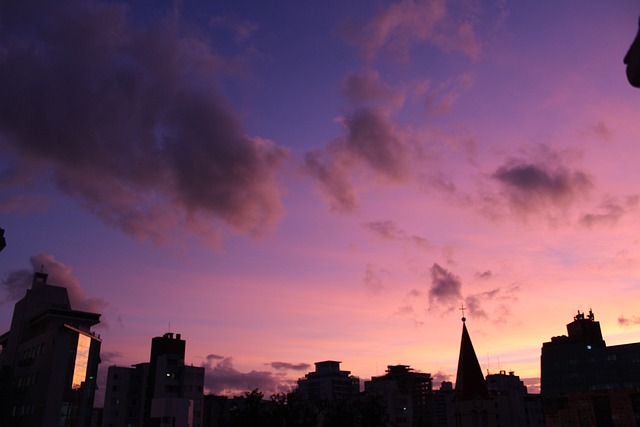
Florianópolis
Florianópolis, often referred to as “Magic Island,” is a captivating city located on the Santa Catarina Island in southern Brazil. Known for its stunning beaches, lush landscapes, and a high quality of life, Florianópolis is a sought-after destination for both Brazilian and international tourists. Here’s an overview of this enchanting city:
Beaches and Natural Beauty:
Florianópolis is renowned for its pristine beaches, each offering its own unique character and charm. Some of the most popular beaches include Praia Mole, Campeche, and Joaquina, which are ideal for surfing and water sports.
The city’s natural beauty extends beyond its beaches, with lush forests, sand dunes, and crystal-clear lagoons, creating opportunities for outdoor activities like hiking, sandboarding, and kiteboarding.
Climate:
The city enjoys a mild and pleasant climate, characterized by warm summers and mild winters, making it a year-round destination for beachgoers and outdoor enthusiasts.
Quality of Life:
Florianópolis consistently ranks high in terms of quality of life in Brazil. The city boasts a well-developed infrastructure, excellent healthcare facilities, and a relatively low crime rate.
It offers a relaxed and laid-back lifestyle, making it an attractive destination for retirees and expats seeking a peaceful atmosphere.
Cultural Scene:
Florianópolis has a vibrant cultural scene, with numerous theaters, art galleries, and music venues. The city hosts a variety of cultural events and festivals throughout the year.
The historical center of Florianópolis features colonial-style buildings and a lively market, where you can experience local cuisine and crafts.
Cost of Living:
While not the cheapest city in Brazil, Florianópolis offers a reasonable cost of living compared to major American cities.
Housing, dining out, and everyday expenses can be affordable, especially when compared to larger Brazilian cities like Rio de Janeiro and São Paulo.
Healthcare:
The city is known for its high-quality healthcare facilities and well-trained medical professionals. Many healthcare providers in Florianópolis speak English, which can be reassuring for expats.
Safety:
Florianópolis is considered one of the safest cities in Brazil. While it’s always essential to exercise typical safety precautions, it offers a sense of security for residents and tourists.
Language:
Portuguese is the official language of Brazil, including Florianópolis. While not as commonly spoken as English, you can find English-speaking locals and expats in tourist areas.
Festivals and Events:
Florianópolis hosts various festivals and events, including the annual Carnival celebrations and the International Jazz Festival, attracting artists and musicians from around the world.
Transportation:
The city has an efficient public transportation system, including buses and a modern bus rapid transit (BRT) system, making it convenient to get around.
Florianópolis is accessible by air, with an international airport providing domestic and limited international flights.
Florianópolis’ combination of natural beauty, high quality of life, and a rich cultural scene makes it an attractive destination for tourists, expats, and retirees alike. Whether you’re relaxing on its stunning beaches, exploring its cultural offerings, or savoring local seafood cuisine, Florianópolis offers a delightful and welcoming experience.
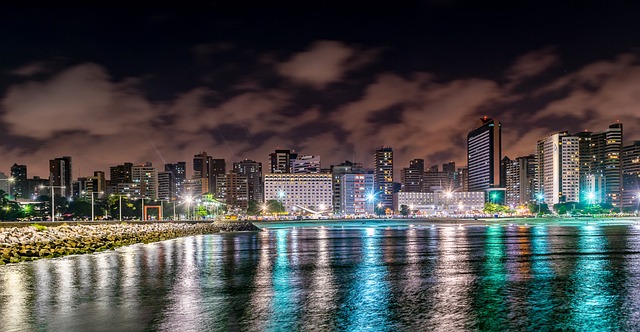
Fortaleza
Fortaleza, a vibrant coastal city located in northeastern Brazil, is a popular destination known for its stunning beaches, rich cultural heritage, and warm tropical climate. Here’s an overview of this captivating city:
Beaches:
Fortaleza boasts some of Brazil’s most beautiful beaches, including Praia de Iracema, Praia do Futuro, and Praia de Cumbuco. These beaches offer golden sands, clear waters, and vibrant beachside culture.
Praia do Futuro is famous for its beachfront restaurants serving fresh seafood and regional dishes.
Cultural Heritage:
Fortaleza has a rich cultural scene, with influences from indigenous, African, and European cultures. This fusion is reflected in the city’s music, dance, and cuisine.
You can experience traditional Brazilian dance forms like forró and samba at local clubs and venues.
Cuisine:
Fortaleza is a paradise for food enthusiasts. The city’s cuisine is characterized by fresh seafood, tropical fruits, and delicious regional dishes.
Be sure to try the local specialties, including moqueca (a fish stew), tapioca, and acarajé (deep-fried black-eyed pea fritters).
Climate:
Fortaleza enjoys a tropical climate with warm temperatures year-round. The city is a great destination for those seeking sun and beach activities.
Cost of Living:
The cost of living in Fortaleza is generally lower than in major American cities. Housing, dining out, and everyday expenses are often affordable.
Healthcare:
The city has a well-developed healthcare system, with modern hospitals and medical facilities. Many healthcare professionals in Fortaleza speak English.
Safety:
While Fortaleza, like any major city, has its share of crime, the beach areas and tourist zones are relatively safe. It’s essential to exercise typical safety precautions.
Language:
Portuguese is the official language of Brazil, including Fortaleza. While English may not be as commonly spoken, you can usually find English-speaking staff at tourist establishments.
Festivals and Events:
Fortaleza hosts various cultural festivals and events throughout the year. One of the most famous is Carnival, which features colorful parades, music, and dance.
Transportation:
The city has a decent public transportation system, including buses and taxis, making it convenient to get around.
Fortaleza is accessible by air, with Pinto Martins International Airport offering domestic and limited international flights.
Tourist Attractions:
Beyond the beaches, Fortaleza offers several attractions, including the Dragão do Mar Cultural Center, which houses art galleries, theaters, and a planetarium.
The city’s historical architecture, such as the Metropolitan Cathedral and the Jose de Alencar Theater, is worth exploring.
Fortaleza’s unique combination of beautiful beaches, cultural richness, and a lively atmosphere make it an attractive destination for tourists and expats seeking a taste of Brazilian coastal life. Whether you’re relaxing on the beach, indulging in local cuisine, or immersing yourself in the city’s vibrant culture, Fortaleza offers a warm and inviting experience.
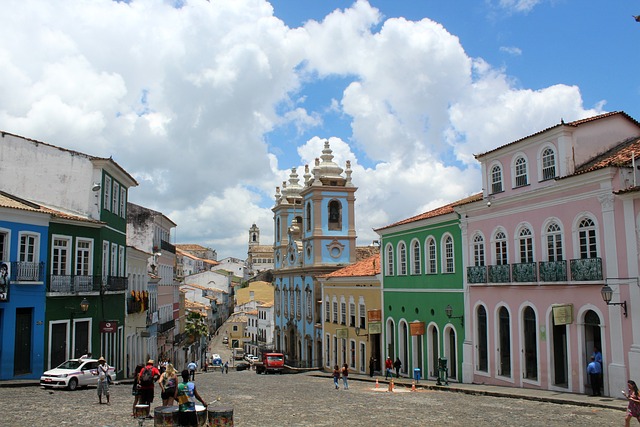
Salvador
Salvador, often referred to as “Salvador da Bahia” or simply “Salvador,” is a captivating and culturally rich city located on the northeastern coast of Brazil. As the capital of the state of Bahia, Salvador is renowned for its vibrant Afro-Brazilian culture, historic architecture, and stunning coastal landscapes. Here’s an overview of this enchanting city:
Cultural Heritage:
Salvador is celebrated for its strong Afro-Brazilian cultural influences, which are deeply embedded in the city’s music, dance, religion, and cuisine.
The city is home to Candomblé and Capoeira, both of which are Afro-Brazilian traditions that have gained international recognition.
Historic Architecture:
The historic center of Salvador, known as the Pelourinho, is a UNESCO World Heritage site and is famous for its well-preserved colonial architecture, colorful buildings, and cobblestone streets.
Visitors can explore historic churches, such as the São Francisco Church and Convent, adorned with intricate Baroque decorations.
Cuisine:
Salvador offers a unique culinary experience with regional dishes that reflect its Bahian heritage. Some must-try dishes include acarajé (deep-fried black-eyed pea fritters), moqueca (a flavorful seafood stew), and vatapá (a shrimp and coconut sauce).
The city is known for its street food culture, and you can savor local delicacies from street vendors.
Festivals and Events:
Salvador is famous for its Carnival, one of the largest and most vibrant in Brazil. It features energetic street parties, parades, and elaborate costumes.
The city hosts various cultural events throughout the year, including music festivals and celebrations of its diverse religious traditions.
Beaches:
Salvador offers a multitude of beautiful beaches, including Porto da Barra, Farol da Barra, and Flamengo Beach. These beaches provide a perfect backdrop for sunbathing and water sports.
Porto da Barra is known for its calm waters and is ideal for swimming and relaxation.
Climate:
Salvador enjoys a tropical climate with warm temperatures throughout the year. It’s a year-round destination for beachgoers and outdoor enthusiasts.
Cost of Living:
The cost of living in Salvador is generally lower than in major American cities. Housing, dining out, and everyday expenses are often affordable.
Healthcare:
The city has a well-developed healthcare system, with modern hospitals and medical facilities. Many healthcare professionals in Salvador speak English.
Safety:
Salvador, like many Brazilian cities, has areas with higher crime rates. It’s essential to exercise typical safety precautions, particularly in certain neighborhoods.
Language:
Portuguese is the official language of Brazil, including Salvador. While English may not be as commonly spoken, you can often find English-speaking staff at tourist establishments.
Transportation:
Salvador has public transportation options, including buses and taxis, making it relatively easy to get around.
The city is accessible by air, with Deputado Luís Eduardo Magalhães International Airport offering domestic and international flights.
Salvador’s unique blend of Afro-Brazilian culture, historic charm, and coastal beauty makes it a captivating destination for travelers and a culturally rich place to live for those seeking an authentic Brazilian experience. Whether you’re exploring its historical treasures, savoring Bahian cuisine, or dancing to the rhythms of samba and axé, Salvador offers a warm and immersive experience in Brazilian culture.
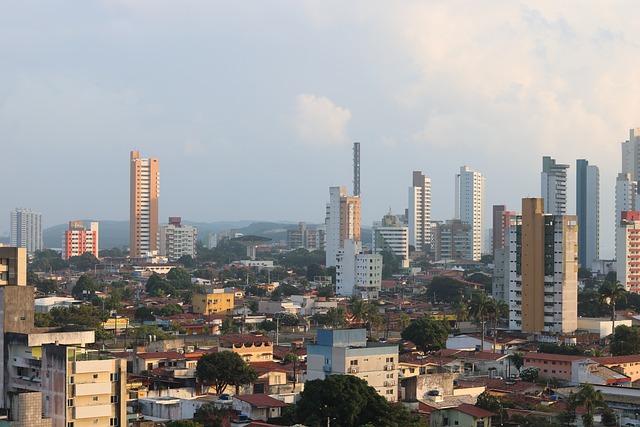
Natal
Natal, located in northeastern Brazil, is a picturesque coastal city known for its stunning beaches, warm climate, and a relaxed atmosphere. As the capital of the state of Rio Grande do Norte, Natal offers a unique blend of natural beauty, cultural richness, and outdoor activities. Here’s an overview of this charming city:
Beaches:
Natal is celebrated for its beautiful beaches, with some of the most popular including Ponta Negra, Genipabu, and Pipa. These beaches feature golden sands, clear waters, and a range of activities such as surfing, kiteboarding, and horseback riding.
Ponta Negra Beach is one of the city’s main attractions, known for its lively beachfront atmosphere and the iconic Morro do Careca sand dune.
Natural Beauty:
The surrounding region of Natal offers stunning natural landscapes, including the Genipabu Sand Dunes and the Parrachos de Maracajaú coral reefs, both of which are popular for day trips and adventure activities.
The city’s coastline is a haven for water sports enthusiasts, offering excellent conditions for windsurfing, stand-up paddleboarding, and snorkeling.
Climate:
Natal enjoys a tropical climate with warm temperatures year-round, making it an ideal destination for sunseekers and beach lovers.
Cost of Living:
The cost of living in Natal is generally lower than in major American cities. Housing, dining out, and everyday expenses are often affordable.
Cultural Scene:
While Natal is not as well-known for its cultural scene as some other Brazilian cities, it still offers various cultural events, including music concerts, dance performances, and local festivals.
The city’s relaxed atmosphere and beautiful surroundings provide inspiration for artists and musicians.
Cuisine:
Natal’s cuisine is influenced by its coastal location, with a focus on fresh seafood. Visitors can savor dishes like fish stew, grilled shrimp, and the regional specialty, “camarão na moranga” (shrimp in a pumpkin sauce).
The city’s beachfront restaurants offer a perfect setting for enjoying the local cuisine.
Healthcare:
Natal has a well-developed healthcare system, with modern hospitals and medical facilities. Many healthcare professionals in Natal speak English, which can be reassuring for expats.
Safety:
Natal is considered relatively safe for residents and tourists, but it’s essential to exercise typical safety precautions, especially in crowded areas.
Language:
Portuguese is the official language of Brazil, including Natal. While English may not be as commonly spoken, you can often find English-speaking staff at tourist establishments.
Transportation:
The city has a public transportation system, including buses and taxis, making it convenient to get around.
Natal is accessible by air through Natal Airpot, which offers domestic and limited international flights.
Natal’s unique combination of natural beauty, outdoor adventures, and a relaxed coastal lifestyle makes it an attractive destination for travelers, retirees, and expats seeking a tranquil and sun-soaked environment. Whether you’re relaxing on its beautiful beaches, exploring the sand dunes, or indulging in fresh seafood cuisine, Natal offers a warm and inviting experience on Brazil’s northeastern coast.
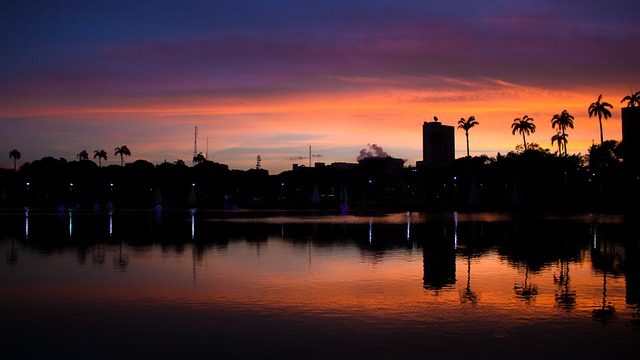
João Pessoa
João Pessoa, located in northeastern Brazil, is a charming and relatively undiscovered city known for its beautiful beaches, historic sites, and a laid-back atmosphere. As the capital of the state of Paraíba, João Pessoa offers a blend of natural beauty, cultural heritage, and a slower pace of life. Here’s an overview of this tranquil city:
Beaches:
João Pessoa boasts some of the most pristine and less crowded beaches in Brazil. Tambaú and Cabo Branco are among the most popular. These beaches feature warm, clear waters and are ideal for swimming and sunbathing.
Praia do Jacaré, famous for its stunning sunsets and live performances of Ravel’s “Bolero” on the saxophone, is a must-visit attraction.
Historical Heritage:
The city has a well-preserved historic center with colonial architecture, including churches like the Igreja de São Francisco and the Igreja de Santo Antônio.
João Pessoa is home to the world’s third-oldest functioning lighthouse, Farol do Cabo Branco, which offers panoramic views of the coastline.
Cultural Scene:
João Pessoa has a modest yet vibrant cultural scene, with local artists, musicians, and traditional performances. The city’s cultural calendar includes music festivals, art exhibitions, and folkloric celebrations.
Cuisine:
Paraíba’s cuisine is characterized by its use of local ingredients. You can savor regional dishes like carne de sol (sun-dried beef), tapioca, and “bolo de rolo” (a rolled sponge cake with guava paste).
The city’s beachfront kiosks and seafood restaurants offer a perfect setting for enjoying the local cuisine.
Cost of Living:
The cost of living in João Pessoa is generally lower than in major American cities. Housing, dining out, and everyday expenses are often affordable.
Healthcare:
João Pessoa has a well-established healthcare system, with modern hospitals and medical facilities. Many healthcare professionals in the city speak English, which can be reassuring for expats.
Safety:
João Pessoa is considered a safe city for residents and tourists, though it’s essential to take typical safety precautions.
Language:
Portuguese is the official language of Brazil, including João Pessoa. While English may not be as commonly spoken, you can often find English-speaking staff at tourist establishments.
Transportation:
The city has a public transportation system, including buses and taxis, making it convenient to get around.
João Pessoa is accessible by air through João Pessoa International Airport, which offers domestic flights.
João Pessoa’s unique blend of natural beauty, historical charm, and a peaceful coastal lifestyle makes it an attractive destination for travelers and expats seeking a more tranquil and authentic Brazilian experience. Whether you’re unwinding on its serene beaches, exploring its historical landmarks, or savoring regional cuisine, João Pessoa offers a warm and inviting escape on Brazil’s northeastern coast.
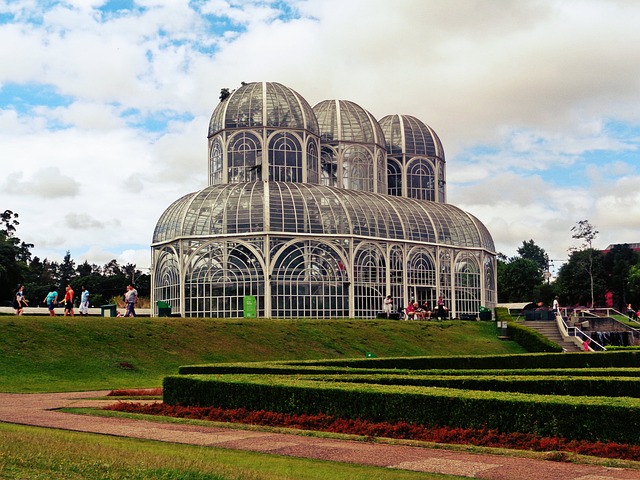
Curitiba
Curitiba, the capital of the state of Paraná in southern Brazil, is a unique and well-planned city celebrated for its urban innovation, green spaces, and high quality of life. With a blend of modernity and natural beauty, Curitiba has earned its reputation as one of Brazil’s most attractive and sustainable cities. Here’s an overview:
Urban Planning:
Curitiba is renowned for its innovative urban planning and public transportation systems. The city’s efficient bus rapid transit (BRT) system, known as the Rede Integrada de Transporte (RIT), is a model for sustainable urban mobility worldwide.
The city’s layout includes designated green spaces, pedestrian-friendly areas, and a commitment to preserving its natural environment.
Green City:
Curitiba boasts numerous parks and green areas, with Barigui Park and Tanguá Park being some of the most popular. These spaces offer opportunities for outdoor activities, picnics, and relaxation.
The Jardim Botânico (Botanical Garden) features a stunning greenhouse, lush gardens, and walking trails.
Cultural Scene:
The city has a thriving cultural scene with theaters, museums, and art galleries. The Oscar Niemeyer Museum (MON) is an architectural marvel and an important cultural institution.
Curitiba hosts various cultural events, including music festivals, dance performances, and theater productions.
Cuisine:
Curitiba offers a diverse culinary scene with influences from European, Asian, and Brazilian cuisines. You can enjoy traditional Brazilian barbecue (churrasco), Italian pasta, and Japanese sushi.
The city’s Mercado Municipal is a bustling food market where you can savor local and international flavors.
Cost of Living:
While not the cheapest city in Brazil, Curitiba offers a reasonable cost of living compared to major American cities. Housing, dining, and everyday expenses are often more affordable.
Healthcare:
The city has a well-developed healthcare system, with modern hospitals and medical facilities. Healthcare professionals in Curitiba are well-trained and offer quality medical care.
Safety:
Curitiba is generally considered a safe city for residents and tourists. However, as with any urban area, it’s important to take typical safety precautions.
Language:
Portuguese is the official language of Brazil, including Curitiba. While English may not be as commonly spoken as in tourist-heavy cities, you can often find English-speaking staff at international establishments.
Transportation:
Curitiba’s public transportation system, the RIT, makes it easy to navigate the city without a car. The city also has a network of bike lanes for cyclists.
Curitiba is accessible by air through Afonso Pena International Airport, which offers domestic and limited international flights.
Curitiba’s unique blend of urban innovation, green spaces, and a commitment to sustainability makes it an attractive destination for travelers and expats looking for a modern and environmentally conscious city. Whether you’re exploring its forward-thinking urban planning, enjoying its cultural offerings, or simply relaxing in its serene parks, Curitiba offers a contemporary and comfortable experience in southern Brazil.
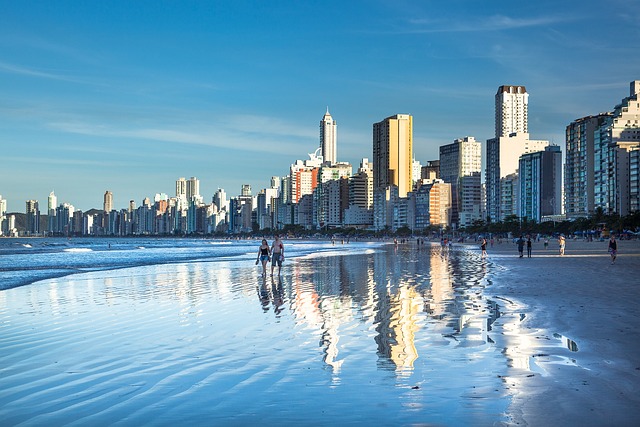
Balneário Camboriú
Balneário Camboriú, often referred to as the “Dubai of Brazil” or the “Brazilian Dubai,” is a dynamic and rapidly growing coastal city located in the southern state of Santa Catarina. Known for its stunning beaches, modern skyline, and vibrant nightlife, Balneário Camboriú has become one of Brazil’s most popular tourist destinations and a sought-after place to live. Here’s an overview of this captivating city:
Beaches:
Balneário Camboriú is famous for its picturesque beaches, including Central Beach (Praia Central) and Laranjeiras Beach (Praia de Laranjeiras). These beaches offer golden sands and clear waters, perfect for sunbathing and water sports.
Uniquely, the city’s coastline is framed by lush green hills and mountains, creating a stunning backdrop.
Skyscrapers and Modernity:
What sets Balneário Camboriú apart is its skyline, often likened to Dubai due to its impressive concentration of high-rise buildings and luxury condominiums.
The city’s most iconic structure is the “Cristo Luz” statue, a Christ the Redeemer-inspired monument that lights up the city at night.
Nightlife and Entertainment:
Balneário Camboriú comes alive at night with a vibrant nightlife scene. The city offers a wide array of bars, nightclubs, and restaurants, making it a popular destination for partygoers.
The Avenida Atlântica, which runs along the beach, is lined with cafes and entertainment options.
Cultural Scene:
While the city is primarily known for its beach culture and modernity, it also offers cultural attractions, including theaters and art galleries. The Cultura e Arte Center is a hub for cultural events and exhibitions.
Nearby cities like Florianópolis and Itajaí provide additional cultural experiences.
Cuisine:
Balneário Camboriú’s cuisine reflects its coastal location, with an abundance of seafood. Visitors can savor dishes like grilled fish, shrimp, and traditional Brazilian feijoada.
The city’s culinary scene also includes international options and fusion cuisine.
Cost of Living:
While the cost of living in Balneário Camboriú can be higher than in some other Brazilian cities, it’s still generally more affordable than major American cities. Housing, dining out, and everyday expenses vary depending on the area.
Healthcare:
The city has access to quality healthcare services, with modern hospitals and medical facilities. Healthcare professionals are well-trained and provide excellent care.
Safety:
Balneário Camboriú is considered a safe city for residents and tourists, but as with any urban area, it’s important to exercise typical safety precautions.
Language:
Portuguese is the official language of Brazil, including Balneário Camboriú. While English may not be as commonly spoken, you can often find English-speaking staff at tourist establishments.
Transportation:
The city has a good transportation network, including buses and taxis. The nearby Navegantes International Airport provides domestic and limited international flights.
